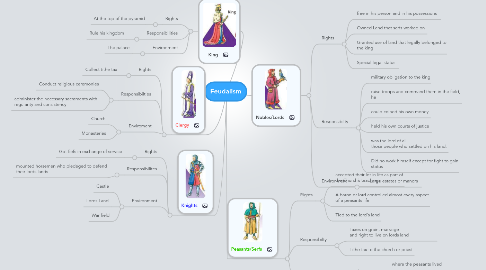
1. King
1.1. Rights
1.1.1. At the top of the pyramid
1.2. Responsibilities
1.2.1. Rule his kingdom
1.3. Environment
1.3.1. The palace
2. Clergy
2.1. Rights
2.1.1. Collect tithe tax
2.2. Responsibilties
2.2.1. Conduct religious ceremonies
2.2.2. administer the necessary sacraments with regularity and consistency
2.3. Enviroment
2.3.1. Church
2.3.2. Monasteries
3. Knights
3.1. Rights
3.1.1. Got fiefs in exchange of service
3.2. Responsibilites
3.2.1. mounted horsemen who pledeged to defend their lords lands
3.3. Environment
3.3.1. Castle
3.3.2. Lords Land
3.3.3. War field
4. Peasants/Serfs
4.1. Rights
4.1.1. accepted their lot in life as part of the Church’s teachings
4.1.2. A baron or lord controlled almost every aspect of a peasants life
4.1.3. Tied to the lord's land
4.2. Responsibilty
4.2.1. Taxes on grain, marraige and right to live on lords land
4.2.2. Tithe tax to the church or priest
4.3. Environment
4.3.1. Lived on a Manor
4.3.1.1. where the peasants lived
4.3.1.2. Demense; the lords land on which the serfs worked on
5. Nobles/Lords
5.1. Rights
5.1.1. free in his person and in his possessions
5.1.2. Owned Land that serfs worked on
5.1.3. Granted use of land that legally belonged to the king
5.1.4. Special legal status
5.2. Responsibilty
5.2.1. military obligation to the king
5.2.2. raise troops and command them in the field, he
5.2.3. could coined his own money
5.2.4. held his own courts of justice
5.2.5. was the lord of all those people who settled on his land.
5.2.6. Did no work himself except for fight to gain status
5.3. Environment
5.3.1. Large estates or manors
